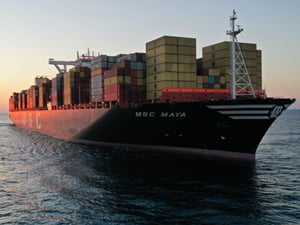While the attacks of the Houthis in Yemen on commercial ships passing through the Red Sea threaten global trade, new ones are added to the commercial ships that have to redraw their routes or stop their sailing.
Houthis’ attacks endanger passage through the Suez Canal, which connects the Mediterranean to the Red Sea, offering the shortest route between Europe and Asia and through which approximately 12 percent of global trade is carried out.
While maritime authorities warn against navigation in the region, statements continue to come from shipping companies that voyages have been suspended or the routes of their ships have changed.
170 ships changed their routes to the south of Africa
In the statement made by the US shipping company CH Robinson, it was reported that more than 25 ships were diverted from the Suez Canal to the Cape of Good Hope over the past week.
“This number is likely to continue to increase due to the ongoing risks of war in the Red Sea and drought in the Panama Canal,” the statement said. expressions were used.
In addition, in the statement made by the US logistics company Flexport, it was noted that as of December 20, the companies directed 170 ships to the south of Africa and 35 ships stopped their sailing.
In the statement, it was stated that this situation caused major delays in most existing shipments, and longer transit times were expected for routes between Asia and Europe and between Asia and the east coast of the USA.
Additional fee application from the German company for transportation from the Middle East
On the other hand, Hapag-Lloyd, Germany’s largest container transportation company, announced that it will impose additional fees for transportation to and from the Middle East on its ships in the new year.
In its statement on the company’s website, it was stated that a seasonal surcharge will be applied as of January 1 for flights from Asia and Oceania to the Red Sea region.
In the statement, it was stated that special additional fees will be applied for transportation from the region covering Egypt, Jordan, Saudi Arabia and Yemen to Asia and Oceania as of the beginning of the year, and as of January 22, these fees will also be applied to the route between India, the Middle East and North America.
The statement stated that additional fees will vary between $250 and $1,000 per container, depending on the route and the size of the container.
While the Danish shipping company Maersk had previously announced additional transportation fees for containers, the French company CMA CGM had also announced a similar practice.
Attacks in the Red Sea raised concerns about a new “supply chain crisis”
Abdulmelik al-Houthi, the leader of the Houthis in Yemen, threatened in his television speech on November 14 that they could target Israeli ships in the Red Sea. Yahya Seri, the military spokesman of the Houthis, announced in his statement on his X social media account on November 19 that they would target any Israeli-flagged ship in response to Israel’s attacks on the blockaded Gaza Strip.
Then, the Houthis launched a UAV and missile attack on two Israeli ships named “Unity Explorer” and “Number Nine” in the Bab al-Mandeb Strait.
CENTCOM announced on the X social media platform on December 4 that 4 attacks were carried out on 3 commercial ships in the international territorial waters in the south of the Red Sea.
Following the deterioration of the security situation in the region, the world’s largest container company, the Italian-Swiss joint Mediterranean Shipping Company (MSC), the Denmark-based shipping company Maersk, the German shipping company Hapag-Lloyd, the French shipping company CMA CGM and the British energy company BP have stopped all their voyages in the Red Sea. had suspended it.
The attacks on commercial ships in the Red Sea and the successive decisions taken by companies increased concerns that a new “supply chain crisis” would begin in the global economy.
While the US administration announced on December 18 that a multinational mission was established against the Houthis’ increasing attacks on international ships in the Red Sea, it was reported that the European Union (EU) was also preparing to join the US initiative to ensure the security of commercial ships in the Red Sea.
The opinions expressed herein are the author’s and not necessarily those of News2Sea.
#number #ships #changing #routes #Red #Sea #increasing
